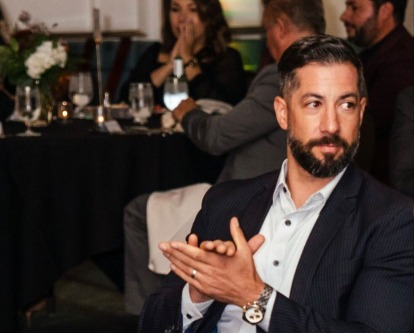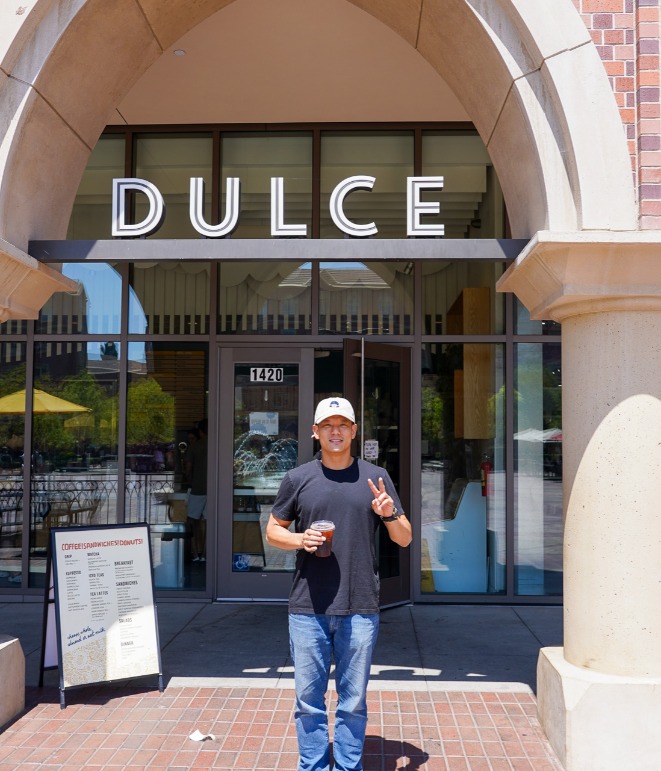
Marine Rediscovers Connection and Confidence through Master of Business for Veterans Program
In the Trojan Network of veterans, Thomas Vriens MBV ’21, a director at GHP Management, found a lasting community that helped him thrive after service.
Dulce Owner Reflects on Coffee and Career Pivots
Dulce Owner Reflects on Coffee and Career Pivots
USC Leventhal alumnus James Choi’s entrepreneurial journey has led him to become one of Los Angeles’ most beloved cafe owners.

James Choi ’05, founder of Cafe Dulce.
[USC Photo]
When USC Leventhal alumnus James Choi crossed the graduation stage in 2005, he never imagined his accounting degree would serve as the foundation for one of the most beloved coffee brands in Los Angeles. As owner and operator of Cafe Dulce, a popular fixture at USC Village and Little Tokyo, Choi’s journey exemplifies how a multifaceted business education can prepare one for unexpected entrepreneurial journeys.
“Marshall just being such a really well-rounded business program, I got a great foundation in so many things,” Choi said. “They cover a breadth of topics that touch on all aspects of business and operations.”
Choi’s path has undergone several twists and turns. Choi moved from Las Vegas to Southern California in 1996 so he could pursue competitive golf. Ultimately, he decided to attend USC Marshall, viewing a business degree as the ideal complement to his athletic ambitions. Going into his senior year, however, Choi shifted his focus to accounting and transferred to Leventhal.
“I was able to land a job at Ernst & Young [now EY] in the Big Four through the accounting program. It was super competitive,” Choi said.
Meanwhile, his mother faced some business obstacles of her own. Although she planned to start a bakery business in Los Angeles, her business partner abandoned their cafe proposal at the last minute. Choi decided to leave his corporate accounting position to save the family investment. And thus, Dulce was born.
“I loved my time in accounting … I felt like I learned so much. I was glad that I made that transition,” Choi reflected. “Being able to help her … and [making] the business work was definitely a blessing, in hindsight.”
Looking back, Choi recognizes that Marshall’s comprehensive business education, combined with his specialized accounting training at Leventhal, provided a versatile foundation of skills that proved invaluable in the unpredictable world of business entrepreneurship.
Marshall just being such a really well-rounded business program, I got a great foundation in so many things. They cover a breadth of topics that touch on all aspects of business and operations.
— James Choi
Founder, Cafe Dulce
Choi’s accounting background and numerical fluency were essential during Cafe Dulce’s uncertain first year, when the business started with just $500 in the bank and no inventory. Choi’s ability to manage cash flow kept the doors open during those critical early months.
Additionally, Choi attributes USC Leventhal’s emphasis on group work to preparing him for the collaborative nature of hospitality management. More importantly, his professional credentials provided legitimacy when negotiating with landlords and expanding his business.
“[People] took me a little bit more seriously given my background in accounting. I wasn’t just some young kid trying to open up coffee shops … It gave me a little bit of credibility to get my foot in the door and be a little bit more of a viable operator that they would take a risk on,” Choi reflected.
Shaped by networking and timing that Choi describes as serendipitous, Dulce opened its second location in 2017 at USC Village and quickly became an integral part of campus life.
To date, Choi operates multiple cafe locations and recently launched his newest concept venture, Yoboseyo Suprette, an innovative one-stop shop boba cafe where customers can shop for trinkets as they wait for their drinks.
Choi’s advice to aspiring entrepreneurs is pragmatic: gain industry experience before taking risks, view jobs as learning opportunities rather than mere paychecks, and remember that “success comes when preparation meets opportunity” — a lesson from his first accounting professor, Merle Hopkins, that still guides his decisions.
RELATED
Marine Rediscovers Connection and Confidence through Master of Business for Veterans Program
In the Trojan Network of veterans, Thomas Vriens MBV ’21, a director at GHP Management, found a lasting community that helped him thrive after service.
MBV Education Helps Veteran Transition From Military into Defense Career at Anduril
With the backing of his degree and the support of the Trojan Network, Randall Parkes MBV ’21 seized an opportunity in cutting-edge defense technology.
Marshall Faculty Publications, Awards, and Honors: October 2025
We are proud to highlight the many accomplishments of Marshall’s exceptional faculty recognized for recently accepted and published research and achievements in their field.
Knight Foundation and USC Marshall Commit $4 Million to Advance Purpose-Driven AI Research
The research initiative aims to create ethical, human-forward outcomes for cutting-edge technology like AI.
Playbook for Career Success: A Q&A with Associate Dean of Career Services Jon Cleveland
Cleveland is innovating the department and leveraging the Trojan Network to get results for students.